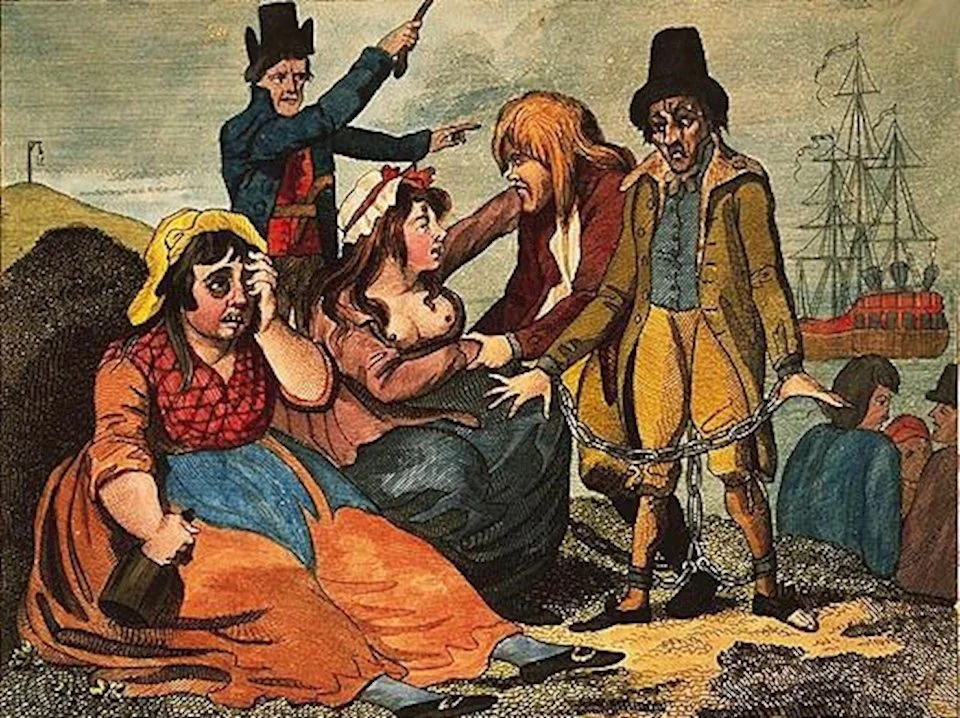Between 1500 and 1650, the population of England rose from 3 million to 5 million without a similar increase in the number of jobs available. As you can probably imagine, this fucked some stuff up pretty badly, resulting in a significant number of people falling into poverty which in turn led to an explosion in the crime rate. Now historically, most less serious crimes had been handled by shaming the shit out of the person, such as via public whippings or brandings, or the ever popular pillory, but with increased urbanization and mobility, these methods became less then effective. For a while, the English legal system dealt with this by just hanging everybody for just about any crime, which for some reason wasn’t all that popular of a solution, nor was the alternative of sending people to hard labor camps to work themselves to death. With jails overflowing to the point that they were basically becoming human cesspools where it would’ve been kinder just to hang people in the first place, something had to be done.
By as early as 1615, England began experimenting with dealing with its burgeoning prison population by forcefully turning them into indentured servants and shipping them overseas. Though never an official government policy, the English legal system just kind of turned a blind eye to merchants basically buying prisoners from jails and shipping them over for profit. Now while the Caribbean colonies didn’t really seem to mind this arrangement, since after all, when you’re already working to death thousands of African slaves on an annual basis, also working to death a couple of convicts doesn’t seem like that big of a deal, the North American colonies were less than thrilled, and though the total number shipped over was less than 3,000, all of the Thirteen Colonies refused to accept convict ships by 1697.
Unfortunately for England, the Caribbean colonies began doing the same around that time as well, as the sugar plantation owners began to realize mixing together African slaves who hated them and enslaved convicts who hated them probably wasn’t the best idea. Now this might have been a great time for the British government to look into a new idea, but no, instead they just passed a law in 1718 forcing all of the colonies to take convicts whether they wanted to or not and created a subsidy to help pay for their transportation across the Atlantic. Prisoners who were selected served out a sentence of seven to fourteen years, after which they were free to do whatever the hell they wanted. Between 1718 and 1775 some 52,000 convicts were shipped to the Thirteen Colonies, 75% of which went to Maryland and Virginia. During the same period 100,000 indentured servants, mostly Scot and English, and 275,000 African slaves were also shipped in.
The reaction to these convict shipments was a bit of a mixed bag. Though improving economic conditions had resulted in fewer people willing to sell themselves into indentured servitude, leading to a labor shortage, especially in the southern colonies, some people were affected more than others. The wealthy plantation owners, having the means to buy all the slaves they needed to meet their labor needs, were of course against the import of convicts, but the less well-off farmers were less so. A convict could be purchased for a fraction of the price of a slave or indentured servant, and since they were convicts, nobody really gave two shits what happened to them which opened up all sorts of options regarding the sadistic treatment of others for profit. Now since one of these groups most definitely had more influence in colonial governments than the other, both Virginia and Maryland repeatedly tried to pass laws to end the practice, to which Britain just laughed because what the hell were the colonies going to do about it, rebel or something?
Anyways, after serving out their sentences, many of the convicts returned to England, wanting to disappear back into the anonymity of crowded urban life, but others chose to stay in the colonies, sometimes by choice and sometimes because they lacked the means to make their way home. Those who stayed often moved to a new area, changed their names, and blended into the broader colonial society, some becoming quite successful and respected in their new lives. The practice of shipping convicts continued unabated until the start of the American Revolution in 1775 for what should be fairly obvious reasons. As the war drug on, the British began putting prisoners in old leaky ships anchored just off the English coast, which was exactly as terrible as it sounds. With thousands of prisoners dying every year, and public outrage over it growing, the British government passed a new law in 1786 where they reformed their prison system by shipping them overseas again, this time to Australia. The British didn’t come up with a new idea until the mid-nineteenth century, by which time they’d shipped some 162,000 convicts to the land down under.

